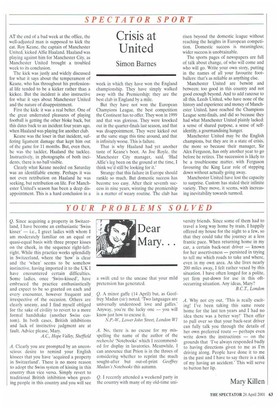Crisis at United
Simon Barnes
AT the end of a bad week at the office, the well-adjusted man is supposed to kick the cat. Roy Keane, the captain of Manchester United, kicked Alfie Haaland. Haaland was playing against him for Manchester City, as Manchester United brought a troubled week to its conclusion.
The kick was justly and widely discussed for what it says about the temperament of Keane, who has throughout his professional life tended to be a kicker rather than a kickee. But the incident is also instructive for what it says about Manchester United and the nature of disappointment.
First the kick: it was a real belter. One of the great underrated pleasures of playing football is getting the other bloke back, but this dates back to an incident four years ago, when Haaland was playing for another club.
Keane was the loser in that incident, suffering ligament damage that kept him out of the game for 11 months. But, even then, he was the tackler, Haaland the tacklee. Instructively, in photographs of both incidents, there is no ball visible.
Clearly what Keane needed on Saturday was an identifiable enemy. Perhaps it was not even retribution on Haaland he was seeking, but retribution on life. For Manchester United's season has been a deep disappointment. This is a hard conclusion in a week in which they have won the England championship. They have simply walked away with the Premiership: they are the best club in England by a mile.
But they have not won the European Champions League, the best competition the Continent has to offer, They won in 1999 and that was glorious. They were knocked Out in the quarter-finals last season, and that was disappointment. They were kicked out at the same stage this time around, and that is infinitely worse. This is failure.
That is why Haaland had yet another taste of Keane's boot. As Joe Royle, the Manchester City manager, said, 'Had Allies leg been on the ground at the time, I think we'd still be looking for it.'
Strange that this failure in Europe should rankle so much. But domestic success has become too easy. After their seventh success in nine years, winning the premiership is a matter of weary routine. The club has risen beyond the domestic league without reaching the heights in European competition. Domestic success is meaningless; wider success is unobtainable.
The sports pages of newspapers are full of talk about change, of who will come and who will go. Write your own story, putting in the names of all your favourite footballers: that's as reliable as anything else.
Manchester United are betwixt and between; too good in this country and not good enough beyond. And to add rancour to all this, Leeds United, who have none of the history and experience and money of Manchester United, have reached the Champions League semi-finals, and did so because they had what Manchester United plainly lacked: a sense of shared purpose, a sense of selfidentity, a gourmandising hunger.
Manchester United may be the English champions, but they are in a state of crisis, the more so because their manager, Sir Alex Ferguson, has only another year to go before he retires. The succession is likely to be a troublesome matter, with Ferguson favouring the King Lear role of stepping down without actually going away.
Manchester United have lost the capacity to surprise. Custom has staled their infinite variety. They move, it seems, with increasing inevitability towards turmoil.


































































 Previous page
Previous page